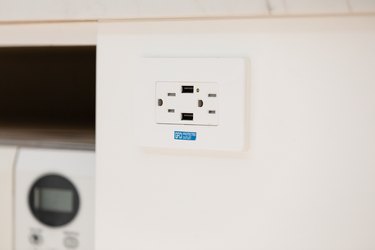
Not only are bad smells offensive to the nose, but they are also warning signs of a potentially serious issue, like a broken pipe or mold growth. If you notice a rotten egg smell, a musty smell, a fishy smell, the smell of cat urine, the smell of something decomposing, or even a new car smell, it's important to identify the source of the odor before you attempt to simply cover it up with air fresheners or cleaning products. Recognizing the reason your house smells can help you eliminate the cause of the smell so you can breathe easier, protect your home from potential damage, and protect your family and yourself from a number of health risks.
1. Damaged Gas Line
Video of the Day
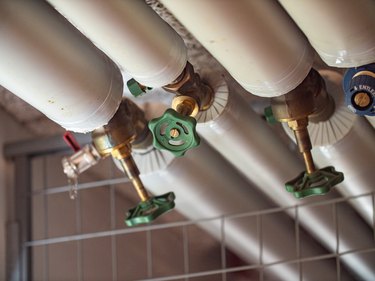
If you notice the smell of rotten eggs in your home, follow your nose to see where the scent is the strongest. If it's anywhere near a gas line, a gas-fired appliance, or a water heater, leave your home immediately (don't use any matches or turn on any lights) and call your gas company from your neighbor's home or your cellphone, not from your home's landline. Rotten egg smell is often a sign of a natural gas leak due to a damaged pipe or an unlit pilot light. Natural gas is naturally odorless and colorless, but gas companies add an unpleasant rotten egg odorant to it to serve as a warning during a gas leak.
Video of the Day
2. Bacteria Buildup in Your Water Heater
Even if you don't have a gas leak, your water heater may still be responsible for that rotten egg smell. If you notice the smell when running hot water (but not cold water) through your faucet, the problem is probably sulfur bacteria buildup in your water heater. Sulfur bacteria produces hydrogen sulfide gas, which can irritate your eyes, nose, and throat and cause nausea, dizziness, fatigue, and headache. If you suspect this may be the issue, call a plumber, who should be able to make a few repairs and increase the temperature in the water heater to kill off the bacterial growth.
3. Sewer Gas Leak

A water heater isn't the only thing that produces hydrogen sulfide; it's also produced by the fecal mater found in sewage, which is why it's often called sewer gas. While home drain and sewage lines are designed to prevent this gas from entering your home, things sometimes go wrong. That could be the reason for a rotten egg smell in your home, especially if you're smelling it in your bathroom.
A common reason for this problem is that the water has dried up in the P-trap of an unused sink drain or toilet, meaning the water that prevents gas from escaping the drain system (which is tied to the sewer system) is no longer there to hold it back. Fortunately, homeowners can easily solve this problem by simply running some water in the sink to fill the P-trap or flushing the toilet (to fill its internal trap). If this doesn't solve the problem or if the smell is the result of another issue, such as a broken sewage pipe or clogged vent pipe, call a plumber.
4. Faulty Electrical Fixture
Unless you happen to have old fish leftovers sitting in your trash can, a fishy smell in your home is something you should take very seriously. A fishy smell is a sign of an overheating or burning electrical component, whether it's an overloaded circuit, faulty outlet, overheating electrical insulation, or another electrical issue. These types of problems require the help of an electrician as soon as possible. If you ignore a faulty electrical fixture, it could cause a fire.
5. Mold or Mildew
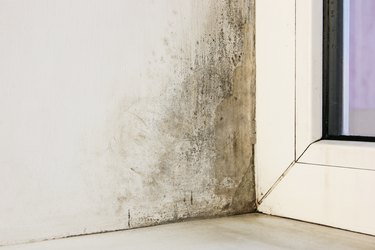
Another common but very problematic smell in the home is a musty or dusty scent, which typically indicates the presence of mildew or mold. This is most commonly found in areas of the house with a lot of water or humidity, such as the kitchen, bathroom, basement, or laundry room. These problems should be addressed quickly because these fungi can cause respiratory problems and rashes in some people, and their presence could be an indication of a water leak that could cause serious damage to your home.
Before treating mold and mildew, identify where they come from by looking for leaking pipes, fixtures, and appliances; checking to see if there could be a leak in your roof; or determining whether excess humidity is trapped in a specific room. If the issue is related to a plumbing leak, call a plumber. If it is related to a leaking roof, you'll need to call a roofing company. Occasionally, the issue will be related to excess humidity — in this case, you simply need to find a way to increase the ventilation in the room by leaving your windows open, running bathroom vent fans, or using a dehumidifier.
Aside from eliminating the source of the moisture, you'll need to kill the mold. For small patches of mold and mildew, clean the area with a mixture of bleach and water. Larger mold and mildew problems will require a professional experienced in this type of work.
If you smell mold or mildew but can't see it, this could be a sign that it is growing behind your drywall, under your flooring, or inside the air ducts of your HVAC system. Contact a professional experienced in mold abatement rather than trying to get inside these areas yourself because doing so could release mold spores into the air. The specialist will be able to remove the mold and mildew, identify the source of the problem, and either fix the issue causing the fungal growth or recommend another professional for the job.
Tip
It's worth noting that front-loading washing machines often smell musty due to mold growth in the door seal and detergent drawer. To keep them dry, leave the door and the detergent drawer open for a few hours after washing a load and clean and dry the rubber door gasket regularly. If you detect a musty smell, clean the washer drum and the door seal with a solution of 3/4 cup bleach to 1 gallon of warm water and then rinse thoroughly to remove the bleach.
5. Trapped Pet Smells
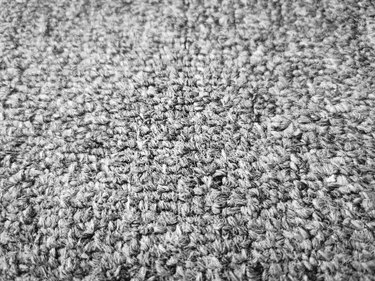
The person who lived in your house before you may have had pets that left smells trapped in your carpet. Whenever there's too much moisture in the air, those trapped smells can reemerge. If you're smelling cat urine but you don't own a cat, for example, this is the most likely culprit. Use an enzyme-based cleanser to neutralize the odor — these products are some of the only things that can break down the uric acid that causes the skunky smell in organic matter, including urine, feces, and food.
6. Decomposing Food
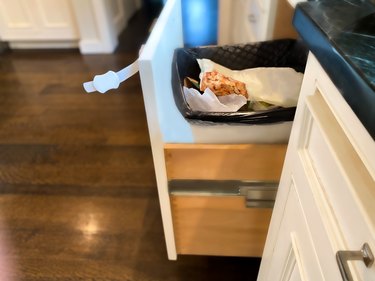
With all the food in a kitchen, it's not surprising that you sometimes encounter a rotten smell here and there. With any luck, this smell is simply coming from a full trash can, but it may instead be coming from the dishwasher, garbage disposal, or refrigerator.
Dishwashers and garbage disposals trap both moisture and rotting food, which creates a particularly nasty smell that's a blend of mold, bacteria, and decomposing food. Combat this by washing your dishwasher's filter once a week, going over it with a soft sponge under running water and wiping up residue in the interior compartment. Kill any lingering bacteria once a month by placing a bowl of vinegar in the bottom rack and running the appliance on its highest heat and dry settings.
For the garbage disposal, try buying commercial garbage disposal cleaners or throw a dozen ice cubes, 1 tablespoon of baking soda, 1 teaspoon of bleach, and a few thin citrus peels down the drain and run the garbage disposal for 30 seconds. Use a sponge or paper towels to remove gunk from under the rubber splash guard around the garbage disposal hole (some splash guards are removable). This is usually the dirtiest area of the appliance and the main source of bad smells.
To keep your fridge and freezer from smelling funky, clean up spills as soon as they occur and throw out old food once a week. Avoid using cleaning products stronger than dish detergent, as they can be absorbed into your foods. Be sure to rinse surfaces well if you use dish soap. If you still have any funky smells in the fridge, you can absorb and eliminate the gross scent by keeping an open box of baking soda or a charcoal bag inside the fridge and replacing it periodically.
7. Animal Intruder

If the decomposing smell doesn't seem to be coming from the trash, dishwasher, garbage disposal, or refrigerator, you might have an animal in your home, either dead or alive. This is most likely the case if the smell is faint at first and then gets stronger over the next few days. The animal causing the smell could be hiding in your walls, under your floorboards, in your chimney, or even on your roof. If you can identify and access the area where a dead animal is located, you can remove it yourself, but first put on gloves and a face mask to avoid touching the animal's bodily fluids or breathing in dangerous pathogens. If the animal is alive or you cannot locate or access a dead animal, call a professional for help.
8. New Furniture
Some people love that distinctive "new car smell," while others can't stand it. The distinct smell comes from air pollutants called volatile organic compounds (VOCs), which can cause nose, eye, and throat irritation; headache; dizziness; and possibly even liver damage, kidney damage, or cancer. If you have purchased a new sofa, mattress, cabinet system, or similar product, the off-gassing of VOCs may leave your home filled with chemicals, like formaldehyde. To get rid of the smell and the problematic compounds, open your windows and turn on ventilation fans to air out your home. If you are particularly sensitive to these chemicals, invest in an air purifier with a carbon filter.

